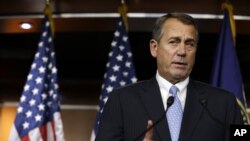CAPITOL HILL —
Republican House Speaker John Boehner is holding a vote in the U.S. House of Representatives late Thursday on an alternative to the compromise proposal to avert massive tax increases and spending cuts put forward by Democratic President Barack Obama.
As the week began, congressional aides said the president and the Speaker appeared to be very close to reaching an agreement to avert a number of measures - including automatic tax increases and severe spending cuts known as the sequester - due to take effect January 1.
But now, the two men have stopped negotiating and Boehner says he is pushing ahead with his own two bills on a tax cut and spending cuts, which he is calling "Plan B."
"Today we will vote to protect as many American families and small businesses as possible from the tax hikes that are already scheduled to occur," he said.
Boehner's bill would raise taxes only on annual incomes of more than $1 million. Democrats are rejecting the plan, saying it will not do anything to solve the country's fiscal problems.
Senate Democrats have already passed a bill that would raise taxes on those Americans earning more than $250,000 a year, and Senate Democratic leader Harry Reid says that is the bill he wants Boehner to send over from the House.
"Until Republicans take up our bill in the House, the one that has passed here, there is nothing to discuss. We are not taking up any of the things that they are working on over there now," he said.
President Obama has said he would veto Boehner's $1 million dollar income threshold bill, and has called for the Speaker to quickly come back to the negotiating table before time runs out.
Democratic lawmakers say that Boehner's vote on "Plan B" is merely a political tactic to try to get the president to give more ground on spending cuts and taxes. Democratic Senator Charles Schumer:
"Basically, 'Plan B' is not taken seriously by anyone in America except a small number in the Republican caucus," he said.
Economists have warned that if the president and Congress do not agree to avert the "fiscal cliff" measures, it could send the U.S. economy back into recession.
Mark Vitner, the senior economist at Wells Fargo Bank, said "I think this is all political theater in that it’s very difficult for the Republicans to come to an agreement before the end of the year. So we are likely to see the Bush tax cuts expire, and then have them reinstated early next year."
Vitner says he believes that the broad outlines of a deal will be known soon, but that nothing will likely be done on it until after Christmas. He said a final vote may not occur until January 2 or 3, before this current session of Congress ends and the newly-elected Congress comes in.
Veteran political analyst Larry Sabato said the current standoff between Speaker Boehner and President Obama reflects a deeper divide in the country.
“This is a reflection of the deep polarization that exists in America and the fact that the two parties really have very little in common. It’s not just a personal thing between President Obama and Speaker Boehner. It’s more that they represent two clearly distinct philosophies of government and it’s awfully difficult to compromise your basic principles," he said.
Throughout the long debate on taxes and spending, Democrats have insisted on raising taxes on the wealthiest Americans, and Republicans have insisted on significant cuts to social programs that Democrats hold dear. With only 11 days left until the end of the year, Americans are watching to see if the two major parties can reach a compromise.




